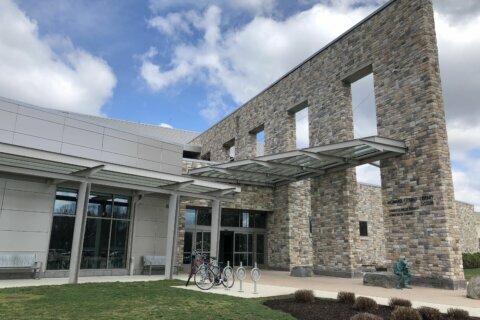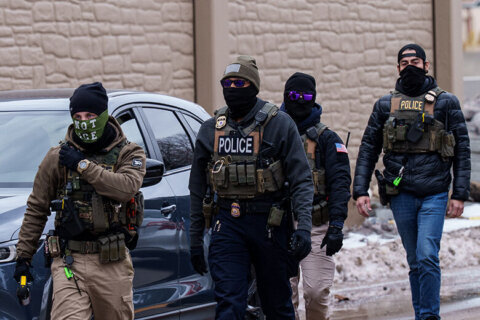This article was republished with permission from WTOP’s news partners at Maryland Matters. Sign up for Maryland Matters’ free email subscription today.
This content was republished with permission from WTOP’s news partners at Maryland Matters. Sign up for Maryland Matters’ free email subscription today.
A new program in Howard County will divert some mental health crisis calls from county police to crisis counselors.
“Every day, people are experiencing mental health challenges in our community and they call 911 in search of help and support in a crisis,” Howard County Executive Calvin Ball (D) said at a news conference announcing the new program Thursday morning. “When there’s not an immediate safety issue, many of these callers — our neighbors — would be best supported by being directly connected with mental health professionals instead of a police response.”
The Howard County Police Department has entered into a memorandum of understanding with Grassroots Crisis Intervention Center to direct non-emergent 911 mental health calls to a hotline staffed with trained crisis counselors through the Communications Initiated Referral to Crisis program.
Howard County dispatchers received about 1,800 calls for behavioral or mental health services in 2020, according to officials.
“Our police department and Grassroots have worked closely together to identify the best courses of action to ensure that there is a balanced approach that meets the needs of our callers, neighbors, family or loved ones and friends,” Ball said.
Beginning July 1, Howard County 911 dispatchers will be directed to ask questions relating to the safety of those reaching out for crisis response, for example: whether the caller presents an immediate threat or has a plan to harm themselves or others, if they have access to a weapon, are under the influence or are under 18.
If none of those factors are at play, dispatchers can ask if they would like to be connected to a mental health professional rather than law enforcement.
If a crisis hotline counselor believes that the caller’s situation has escalated and warrants police intervention, they have the ability to reach out to law enforcement and the county’s mobile crisis team for assistance.
“If there is any indication that a person may be a danger to themselves or others, our dispatchers will immediately send police officers,” Howard County Police Chief Lisa D. Myers said Thursday. “But if the answers to those protocol questions indicate a person is not in danger and may benefit from talking through their crisis, dispatchers now have another option.”
Denise Giuliano, the executive director of the Howard County chapter of the National Alliance on Mental Illness, said that crisis situations are often exacerbated by police interaction but calling 911 may be someone’s safest or only option.
“When a loved one is having a mental health crisis, it’s traumatic for the entire family,” said Giuliano. “We know that every second counts in a mental health emergency, and that many of those 911 calls could be better directed to a mental health crisis counselor than to police.”
Grassroots Crisis Intervention Center currently runs a 24-hour hotline to connect people with services relating to emergency shelter, substance abuse disorders, suicide, domestic violence and family or relationship problems.
Myers said that her officers are trained in mental health issues, de-escalation tactics and verbal negotiation, and the department has already partnered with Grassroots to create the county’s mobile crisis team.
But she conceded that there are times when people place 911 calls that are not best handled by the police.
“When people call 911, they are often experiencing the worst moments of their lives,” Myers said. “Our dispatchers excel at keeping people calm and ensuring they get the resources that they need and, in some cases, help may be in the form of a counselor instead of a police officer.”







